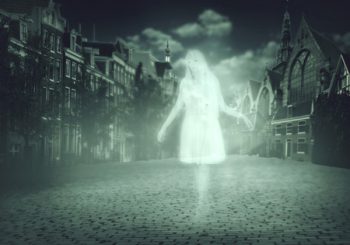Guest writer for Wake Up World
As an ex-musician, I love to read books about music and musicians. At the moment I’m reading Lady Sings the Blues, jazz singer Billie Holiday’s harrowing memoir of a life beset by poverty, exploitation, and racism. Holiday’s mother was only 13 when she gave birth to her daughter, and they had a very close relationship. Midway through the book, Holiday describes a strange experience while sitting in a hotel room in Washington with her boyfriend, shortly after a show:
[pro_ad_display_adzone id=”110028″]
‘I don’t believe in ghosts or spirits, but I believe what happened that night…We were just sitting there when suddenly I felt my mother come up behind me and put her hand on my shoulders. And I knew she was dead. I turned to Joe. “Mama just left and she’s dead,” I told him.
“You’re crazy,” he told me. “You must be blowing your top.”
“You listen to what I said,” I told him, “and g*ddamnit, you better be good to me because you’re all I’ve got now.”
Holiday’s mother had not been ill and was only 38, so there was no expectation that she was going to die. The next morning, Holiday noticed that everyone was acting strangely around her. She went up to the road manager and “told him Mama was dead and what time she died the night before…He blew his top, raised hell with everybody backstage. He swore somebody must have told me. But nobody had told me nothing.”
Crisis Apparitions
When paranormal researchers began to investigate such experiences at the end of the 19th century, they termed them “crisis apparitions”—when people have visions of (or sense the presence of) friends or relatives around the time of their death, even though they are physically distant.
Since then, thousands of reports have been collected and investigated. In some cases, people might already be aware that their friends or relatives are seriously ill, but usually—as with Billie Holiday—the death is unexpected. Even if the apparition doesn’t communicate that they have just died, the friend or relative somehow immediately “knows”—again, as with Billie Holiday—that this is the case.
In one of the cases of crisis apparitions I have investigated myself, a young woman was on vacation and started to feel concerned about a friend who hadn’t returned to their youth hostel. He was a fell runner and had set off that morning to run up a mountain. Suddenly, the man appeared before her, although not in his normal physical form. He walked up the stairs of the youth hostel, then “moved towards me as though he was floating and with his arm outstretched as though trying to reach out to me. I just sensed he had died and was visiting the people and places he knew as though trying to figure out where he was. I went downstairs to tell my boyfriend that I’d seen our friend and felt he had passed.” The man’s dead body found was on the mountain the next day.
In some cases, people report short conversations with the deceased relative or friend, who appears to be aware that they have just died and want to say goodbye. For example, in a case reported by the psi researcher Ken Vincent, a woman described how her aunt “came to her in a dream and told her goodbye and that she had died.” The woman woke up screaming to the sound of her phone ringing. It was her sister telling her that her aunt had just died.
As with Billie Holiday, sometimes crisis apparitions take the form of feeling or being touched by a deceased person. In other cases, they may be auditory experiences, or powerful emotional reactions or physical sensations at the time of a person’s death.
Can Crisis Apparitions Be Explained?
Can crisis apparitions be explained in terms of mundane factors such as coincidence, wishful thinking, or self-deception? Since they seem so bizarre, it might seem sensible to adopt such explanations. However, I think they are highly dubious. The chances of someone like Billie Holiday inadvertently “guessing” the unexpected moment of her mother’s death would be way beyond any measure of probability.
A skeptic might also argue that people retrospectively deceive themselves into believing they have the experiences as a way of coping with the pain of bereavement. However, this also seems highly unlikely, since the experiences are often reported immediately. It’s also important to note that, as with Billie Holiday, many people who have crisis apparitions don’t believe in psi or the supernatural, so wouldn’t be cognitively primed to deceive themselves in this way.
So what’s the alternative? Is it really possible that there is some kind of “spirit” or “subtle body” that leaves the physical body at the time of death and can travel across distances to communicate with relatives and friends? If this is the case, it would indicate the possibility of life after death.
Or is it possible—as some psi researchers have suggested—that the experiences can be explained in some form of telepathy? That is, as a person dies, they make telepathic contact with friends and relatives, who are able to sense their death. It’s true that psi research suggests that telepathy is most likely to occur between people with strong emotional bonds. However, telepathy as it is normally reported is much less specific and direct than these experiences. It is usually limited to sensing information or intentions, rather than visions and conversations.
I’m not entirely sure how to interpret these experiences. However, they are certainly a reminder that—as I have pointed out in my book Spiritual Science—our culture’s standard materialist worldview is inadequate. They are a reminder that, in the words of Hamlet in Shakespeare’s play, “There are more things in heaven and earth…than are dreamt of in [our] philosophy.”
Some academics and scientists believe that we have a fairly complete and reliable understanding of how the world works and that we can deny the existence of anomalous experiences such as crisis apparitions. But it’s inevitable that there are vast ranges of phenomena beyond those which we can understand or explain. We are only animals after all, with a limited awareness and understanding. Reality will always be more mysterious than we can comprehend—which is one of the reasons why life is such an exhilarating experience.
Recommended articles by Steve Taylor, Ph.D:
- Hypnotic Healing: What is Responsible for the Placebo Effect and Hypnosis?
- Beyond Religion: Will Human Beings Ever Transcend the Need for Religions?
- The Transformational Effects of Bereavement
- Post-Traumatic Creativity: How Psychological Turmoil Can Unlock Our Creative Potential
- The Meaning of Life May Be Life Itself
- Spiritual Depression
- Do Psi Phenomena Exist? A Debate (Part One)
- Do Psi Phenomena Exist? The Debate Continues
- David Ditchfield’s Remarkable Near Death Experience
About the author:
Steve Taylor is a senior lecturer in Psychology at Leeds Beckett University, UK. His latest books in the US are The Calm Center and Back to Sanity: Healing the Madness of the Human Mind. He is also the author of The Fall, Waking From Sleep, and Out Of The Darkness. His books have been published in 19 languages. His research has appeared in The Journal of Transpersonal Psychology, The Journal of Consciousness Studies, The Transpersonal Psychology Review, The International Journal of Transpersonal Studies, as well as the popular media in the UK, including on BBC World TV, The Guardian, and The Independent.
Connect with Steve at StevenMTaylor.com.
[pro_ad_display_adzone id=”110027″]








